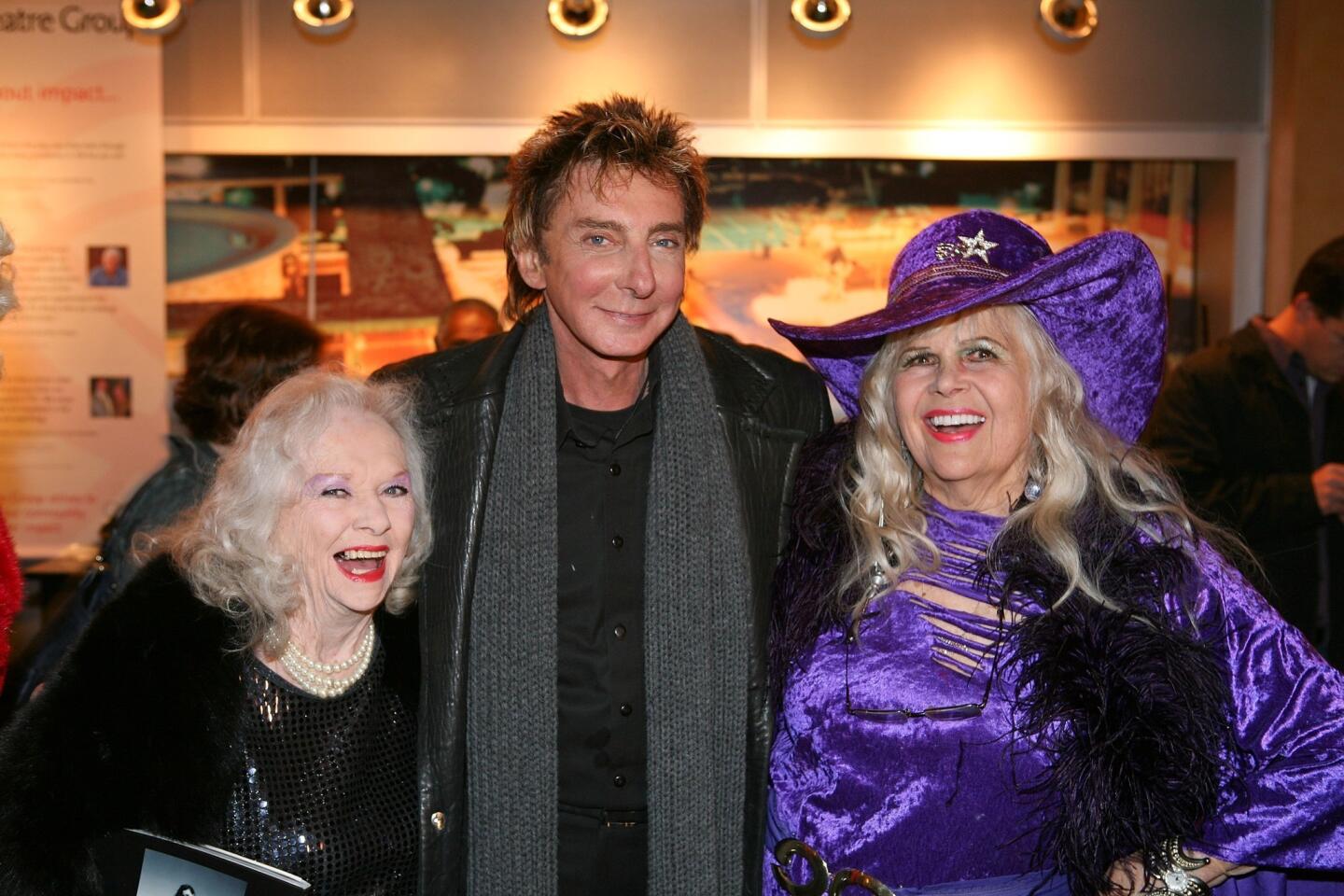Gloria Pall dies at 85; Voluptua character deemed too sexy for TV
- Share via
On a December night in 1954, Los Angeles met the woman it would soon deem too hot for television.
After the success of Vampira, the glamorous ghoul of 1950s late-night TV, executives at KABC-TV (Channel 7) cast Gloria Pall, a showgirl and model, as Voluptua, the sultry hostess of a new, love-themed movie program.
Fans dubbed the statuesque Pall “Eyeful Tower” and “Miss Cleavage” for her shapely figure and plunging necklines. Her steamy on-camera poses and flirtatious comments soon earned her another moniker: “Corruptua.”
Just seven weeks after it first aired, amid mounting pressure from religious and PTA groups and lackluster commercial sponsorship, the station abruptly canceled the show.
Pall, who went on to become a Los Angeles real estate agent, died Dec. 30 of heart failure at a Burbank hospital, her son, Jefferson Kane, said. She was 85.
R.H. Greene, a Los Angeles author and documentary filmmaker who put together a 2011 radio feature on Voluptua for KPCC-FM (89.3), called Pall a television pioneer.
“She was quite openly in touch with her sexuality, and that was an incredibly dangerous thing to do,” Greene said in an interview Friday. “We don’t have too many stories for that time that illustrate that, and Gloria’s does.”
Each Wednesday night, as the show’s romantic theme song played, Pall slinked across Southland TV screens wearing an evening gown and dragging a fur coat.
Before she introduced the week’s romantic flick, she greeted viewers with a breathy coo: “Welcome to my boudoir, I want you to feel that it’s your special hideaway. Relax, take off your shoes, loosen your tie.”
She caressed a bearskin rug, made silhouetted on-camera costume changes behind a translucent screen and answered a phone that didn’t ring. Instead, it sighed her name: “Voluptua…Voluptua.”
As she signed off, by now clad only in a men’s pajama top, she kissed the camera goodbye.
“You put that on television and people went crazy,” Greene said. “They were simultaneously titillated and appalled. Gloria was way too hot to handle.”
In a posting on her website, Pall described the over-the-top character she created as “just suggestive — corny not porny.”
The show’s risque theme and the protests it drew attracted national media attention. In 1955, Pall was featured in photo spreads in Playboy and Life.
Born Gloria Pallatz on July 15, 1927, in Brooklyn, New York, Pall grew up in poverty, her son said. As a teenager, she worked as an aircraft mechanic and as a filing clerk for the United Service Organization. She said later that she was working at the organization’s office on the 56th floor of the Empire State Building on July 28, 1945, when an Army B-25 bomber crashed into the building.
“It threw me across the room, and I landed against the wall,” Pall told National Public Radio in 2008. “We didn’t know if it was a bomb or what happened. It was terrifying.”
In 1947, she won the Miss Flatbush beauty contest in her hometown and then worked as a model.
After stints as a showgirl in Reno and Las Vegas, she moved to Hollywood, where she landed small but memorable roles.
In an iconic image from the 1957 film “Jailhouse Rock,” Pall’s legs frame Elvis Presley’s face at a burlesque show; she clutches Kirk Douglas’ arm in a scene from 1954’s “20,000 Leagues Under the Sea”; and in “Crimson Kimono,” a classic 1959 film noir, Pall played a stripper named Sugar Torch, who gets shot in the opening scene.
In her 30s, her film roles growing scarce, Pall started studying for a real estate license.
“I decided that I ought to do something with my life besides going to parties and doing occasional modeling work,” she told The Times in 1962, adding, “I’ve finally got my name in lights on the Strip.”
Indeed, the sign outside her lavender-hued real estate office on Sunset read simply: “Call Pall.”
In 1965, Pall married Allen Kane, who owned a Ford dealership in North Hollywood. The couple, who later divorced, moved with their young son to Florida and Atlanta before returning to California in the late 1970s.
Pall, who drove a lavender 1957 Ford Thunderbird and dressed mainly in shades of purple, later wrote and self-published several books about her life.
“She just knew so much about the ‘50s,” her son said. “Those were her glory days.”
A memorial is planned for 3 p.m. Jan. 20 at Calvary Baptist Church in Burbank, 724 S. Glenoaks Blvd.
Asked toward the end of her life what she would say to those who campaigned to get Voluptua off the air, Pall laughed and offered three words: “Get a life.”
More to Read
Start your day right
Sign up for Essential California for the L.A. Times biggest news, features and recommendations in your inbox six days a week.
You may occasionally receive promotional content from the Los Angeles Times.






